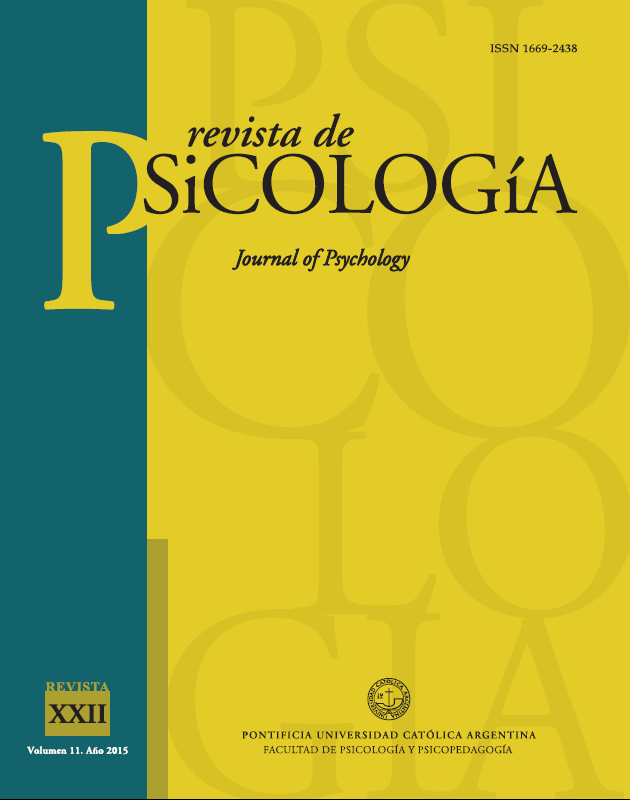Emotional climate, insecurity and fear of crime. Differential perceptions depending on the ideological self-positioning
Keywords:
Emotional climate, insecurity, fear of crime, ideological self-positioningAbstract
An emotional climate is not the mere sum of
individual emotions but a collective phenomenon
generated by how individuals interact with others
as collective answers to their economic, political
and social conditions (de Rivera, 2014).
Meanwhile, in the Argentine context, insecurity is
the main social problem perceived in the last years.
On this frame, a study was conducted with the aim
of analyzing the emotional climate, the perception
of insecurity and the fear of crime along with other
psychosocial factors, and of exploring differential
perceptive profiles according to the ideological
self-positioning. The sample, intentional, was
composed by 516 college students. The results
show a negative emotional climate (anger and
hopelessness), low institutional trust, anomic
frustration and high perception of insecurity.
Differences were observed when comparing the
participant´s perception in function of their
ideological self-positioning. Perception of a
positive emotional climate is greater among
people who are more oriented to the left, showing
more security, less hopelessness and anger. Also,
participants with left political orientation exhibit
less fear of crime, less concern about insecurity
and a minor probability of victimization risk.
However, those who were positioned ideologically
towards the right show higher levels of anomic
frustration, and institutional trust (or distrust)
varies by ideological positioning depending on the
institution which is being evaluated. Finally, the
others perception of insecurity is greater than the
own perception, thus emerging as defensive
mechanisms illusion of invulnerability, which
carry higher risk
Downloads
References
Arnoso, M., Muratori, M., Zubieta, E., Cárdenas, M., Bombelli, J. & Páez, D. (2014). Evaluación de medidas retributivas y restaurativas luego de pasados políticos traumáticos: una mirada al caso argentino. http://revista.fhycs.unju.edu.ar/revistacuadernos/index.php/cuadernos/article/view/250
Bar-Tal, D., Halperin, E. y de Rivera, J. (2007). Collective emotions in conflict situations: Societal implications. Journal of Social Issues, 63, 441-460.
Basabe, N. & Páez, D. (2006). Alienación, anomia y la escala de frustración anómica de Srole y Christie. Documento técnico. Universidad del País Vasco.
Bericat Alastuey, E. (2002). ¿Sienten las sociedades? Emociones individuales, sociales y colectivas. En P. Fernández Berrocal y N. Ramos Díaz (Eds.), Corazones inteligentes (pp. 121-144). Barcelona: Editorial Kairós.
de Rivera, J. (1992). Emotional climate: social structure and emotional dynamics. International Review of Studies on Emotion, 2, 197-218.
de Rivera, J. (2014). Culturas de paz y el clima emocional de las sociedades. En E. Zubieta, J. Valencia & G. Delfino (Eds.), Psicología Social y Política: procesos teóricos y estudios aplicados (pp.159-178). Buenos Aires: EUDEBA.
Grossi, J. & Ovejero, A. (1994). Alienación y participación política en la universidad de Oviedo. Psicología Política, 8, 45-61.
Kitayama, S. & Markus, H. R. (1994). Introduction to cultural psychology and emotion research. En S. Kitayama & H. R. Markus (Eds.), Emotion and culture: Empirical studies of mutual influence (pp. 1-19). Washington DC: American Psychological Association Press.
Munné, F. (1980). Psicología social. Barcelona: CEAC.
Muratori, M., Delfino, G. I. & Zubieta, E. (2013). Percepción de anomia, confianza y bienestar: la mirada desde la psicología social. Revista de Psicología, 31(1), 129-150.
Muratori, M. & Zubieta, E. (2013). Miedo al delito y victimización como factores influyentes en la percepción del contexto social y clima emocional. Boletín de Psicología, 109, 7-18.
Páez, D. (2004). Pensamiento, rendimiento grupal y cultura. En D. Páez, I. Férnandez, S. Ubillos & E. Zubieta (Eds.), Psicología social, cultura y educación (pp. 669-691). Madrid: Pearson Prentice Hall.
Páez, D. & Asún, D. (1994). Emotional climate, mood and collective behavior: Chile 1973-1990. En H. Riguelme (Ed.), Era in twilight. Friburg (pp. 56-80). Bilbao: Foundation for Children/Instituto Horizonte.
Páez, D., Ruiz, J. I., Gailly, O., Kornblit, A., Wiesenfeld, E. & Vidal, C. M. (1996). Trauma político y clima emocional: una investigación transcultural. Psicología Política, 12, 47-69.
Páez, D., Ruiz, J. I., Gailly, O., Kornblit, A., Wiesenfeld, E. & Vidal, C. M. (1997). Clima emocional: su concepto y medición mediante una investigación transcultural. Revista de Psicología Social, 12(1), 79-98.
Páez, D. & Zubieta, E. (2004). Cognición Social: Sesgos heurísticos y atribución de causalidad. En D. Páez, I. Fernández, S. Ubillos & E. Zubieta (Eds.). Psicología Social, Cultura y Educación (pp. 263-300). Madrid: Pearson Educación.
Rodríguez, M., Sabucedo, J. M. & Costa, M. (1993). Factores motivacionales y psicosociales asociados a los distintos tipos de acción política. Psicología Política, 7, 19-38.
Schwartz, S. H. & Rubel-Lifschitz, T. (2009). Cross-national variation in the size of sex differences in values: effects of gender equality. Journal of Personality and Social Psychology, 97(1), 171-185.
Srole, L. (1956). Social integration and certain corollaries: an exploratory study. American Sociological Review, 21(6), 709-716.
Stoetzel, J. (1983). ¿Qué pensamos los europeos? Madrid: Mapfre.
Vozmediano, L. (2010). Percepción de inseguridad y conductas de autoprotección: propuestas para una medición contextualizada del miedo al delito. Eguzkilore, 24, 203-237.
Zubieta, E. M. (2008). Valores humanos y conducta social. En M. M. Casullo (Ed.), Prácticas en psicología positiva (pp. 201-229). Buenos Aires: Lugar Editorial.
Zubieta, E., Delfino, G. & Fernández, O. (2007). Confianza Institucional y el rol mediador de creencias y valores. Revista de Psicología, (6), 101-120.
Zubieta, E. M., Delfino, G. I. & Fernández, O. D. (2008). Clima social emocional, confianza en las instituciones y percepción de problemas sociales. Un estudio con estudiantes universitarios urbanos argentinos. Psykhe, 17(1), 5-16.
Zubieta, E. M., Muratori, M. & Mele, S. (2012). Bienestar, clima emocional, percepción de problemas sociales y confianza. Anuario de Investigaciones, 19, 97-106.
Downloads
Published
How to Cite
Issue
Section
License
Copyright (c) 2019 Marcela Muratori, Elena Zubieta

This work is licensed under a Creative Commons Attribution-NonCommercial-ShareAlike 4.0 International License.














